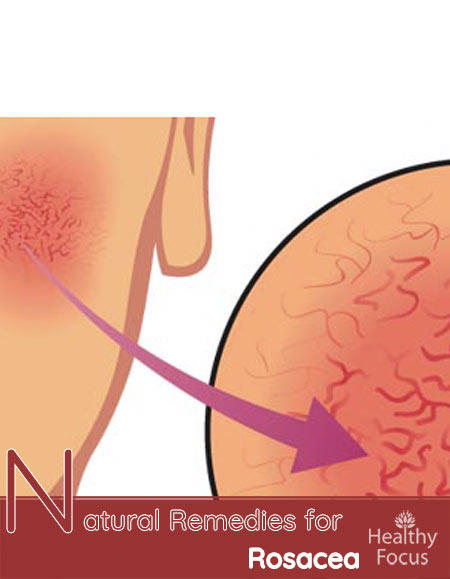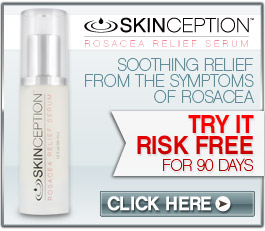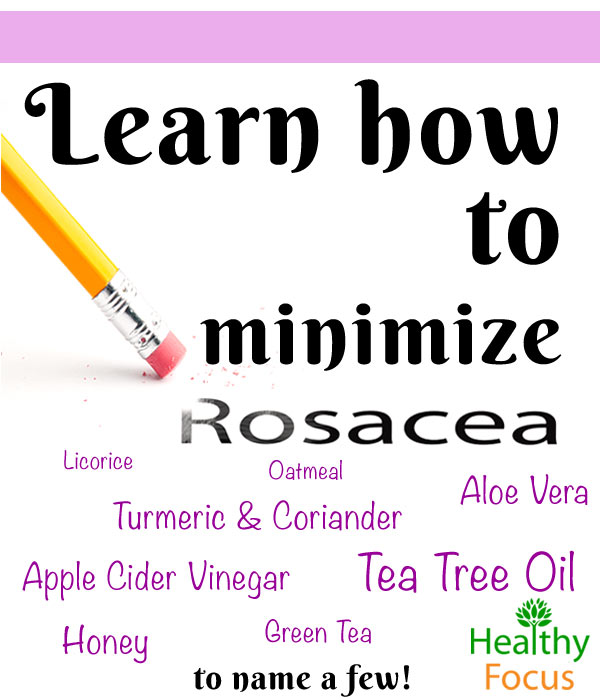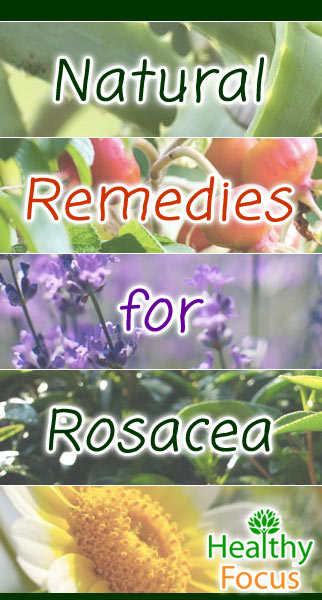Last Updated on December 1, 2019 by Marc Seward

Rosacea is a common chronic skin condition that usually affects a person’s face, particularly the skin on the cheeks, nose, chin, eyelids, or forehead.Redness, inflammation, pustules characterize rosacea, and sensitivity attributed to enlarged blood vessels just below the surface of the skin. The severity of this condition varies from person to person and usually starts around middle age.
Symptoms
The severity of rosacea varies from people to people, often being mistaken for acne, allergies, or other skin problems. The usual tell tale sign of rosacea is red skin, however, Rosacea is also responsible for the following symptoms:
• Tiny, spider-like blood vessels on the face
• Red patches or bumps on the cheeks, forehead, nose, and chin
• Burning sensation on the face
• A red, bulbous nose
• Thick, dry skin
• Swollen eyelids
Causes
It is still unknown what exactly causes rosacea, but it does tend to run in families. This condition, usually starting around middle age, is most commonly seen among people of Celtic and Northern European ancestry, especially those with a fair complexion. There are a number of factors that appear to contribute to a flare up of rosacea:
• Stress
• Exposure to direct sunlight
• Alcohol
• Coffee and caffeinated beverages
• Spicy foods
• Intense exercise
• Living in an area that experience extreme temperatures
• Some medications such as corticosteroids and some blood pressure medications
• General health
It is always a good idea to work with your doctor or medical professional on treatment plans and solutions. There are many home remedies that you can add to your skin care regime that can help.
Natural Remedies
While there is currently no cure for rosacea, there are a number of natural remedies you can use at home to help minimize the symptoms and flare ups, allowing you to go on with your daily routine without constantly worrying about the painful inflamed redness on your face.
Just because these are natural home remedies does not mean they are weak. These natural solutions have many powerful active ingredients.
Chamomile Compress
Chamomile is a great way to address problems associated with rosacea due to its anti-inflammatory properties, helping to minimize redness and reducing inflammation. To make a soothing chamomile compress:
- Steep 3 to 6 chamomile tea bags in 3 cups of boiling water for about ten minutes.
- Remove the tea bags and allow to cool in the refrigerator until the water is cold.
- Dampen a clean, cotton cloth in the solution and wring out the extra liquid.
- Place on the affected area for 15-20 minutes.
- Repeat 3-4 times a day until symptoms subside.
Some people may experience an allergic reaction to chamomile, so do a patch test before trying this treatment.
Tea Tree Oil
Tea tree oil is great for treating symptoms of rosacea due to its antiseptic and anti-inflammatory properties. Tea tree oil also kills demodex mites which some research has shown may contribute to flare ups.
- Dip a clean cotton swab into a bottle of tea tree oil and then gently apply it to the affected areas of your face.
- Apply twice daily.
Use tea tree oil with caution, as it can be irritating on some skin.
Lavender Oil
This antiseptic is great for soothing painful, inflammatory conditions of the skin. Lavender will help shrink inflamed blood vessels and ease inflammation.
- Thoroughly wash and dry face.
- Soak a cotton ball in 100% pure organic, therapeutic grade lavender oil and gently massage onto problematic areas.
- Apply twice daily for a couple weeks.
When starting this treatment, start with a small amount to see how your skin reacts to essential lavender oil.
Rosehip Oil
Packed with vitamin A, vitamin E, and essential fatty acids, rosehip oil promotes the regeneration of skin cells and encourages skin to become firmer and more youthful.
- Cleanse and thoroughly dry face.
- Soak a cotton ball in rose hip oil and apply to affected areas of the face.
- Apply twice daily.
Oatmeal
Oatmeal is a common go-to itching, inflamed skin conditions because it contains antioxidant and anti-inflammatory properties. Oatmeal is known to minimize redness, relieve itching, and reduce inflammation.
- Mix a bit of water with 2 tablespoons of oatmeal.
- Lightly smooth the oatmeal onto the affected regions of the face.
- Leave on for 20 minutes.
- Rinse with cool water and gently dry face with a soft towel.
- Repeat remedy twice a day every day until symptoms start to improve.
Green Tea
Packed with anti-inflammatory, antioxidant, anticarcinogenic properties, green tea is a great remedy for rosacea. The sun often antagonizes rosacea flare ups, however, green tea helps to protect the skin from harmful ultraviolet rays, preventing pustules and bumps from popping up on the inflamed area.
- Steep 3 to 6 green tea bags in 3 cups of boiling water for about ten minutes.
- Remove the tea bags and allow to cool in the refrigerator until the water is cold.
- Dampen a clean, cotton cloth in the solution and wring out the extra liquid.
- Place on the affected area for 15-20 minutes.
- Repeat 3-4 times a day until symptoms subside.
- Drinking green tea is also recommended. By ingesting green tea twice a day, you not only help your skin stay hydrated, but you also consume a bunch of antioxidants that will promote the healing process of your skin.
Aloe Vera
Although primarily known for treating burns, Aloe Vera is also an effective treatment for rosacea. The anti-inflammatory properties of this wonder plant reduce redness and irritation, while rejuvenating the skin. For the treatment of rosacea, Aloe Vera can be taken orally or topically.
- Topically: Apply gel extracted from a Aloe Vera plant directly to the affected region of skin.
- Allow to air dry and then rinse with cool water.
- Apply twice a day every day until symptoms subside.
Orally: Take one tablespoon of Aloe Vera juice twice daily to help detox your body and speed up the healing process.
Turmeric and Coriander
Turmeric and coriander are antiseptic herbs that also contain powerful antibacterial properties known to reduce inflammation and redness. Applying this mask to your face will soothe and nourish damaged skin.
- Mix 2 teaspoons of turmeric powder, 4 teaspoons of coriander powder, and 2 tablespoons of milk in a small dish.
- Stir until mixture becomes a paste.
- Gently smooth paste onto the affected areas of the face and leave on for 10 minutes.
- Rinse with cool water and gently pat the face dry.
- Apply this mask twice daily.
Apple Cider Vinegar
The anti-inflammatory properties of apple cider vinegar are effective in the treatment of rosacea whether you take it topically or orally. Apple cider vinegar works hard to maintain normal pH levels in your body while it naturally kills yeast and bacteria on the skin.
- Topically: Dilute 2 tablespoons of apple cider vinegar with 8 tablespoons of water.
- Apply this mixture to the affected area and leave on for 10 minutes.
- Rinse off with cool water.
- Repeat twice a day every day for 2 months.
Orally: Ingest 2 teaspoons twice daily.
Licorice
Many over the counter skin creams contain licorice extract to reduce redness. Licorice extract is an anti-inflammatory known to soothe irritation and encourage the growth of healthy skin cells.
- Mix a tablespoon of licorice powder with a teaspoon of honey, and a teaspoon of Aloe Vera gel.
- Smooth this mixture over the affected area.
- Leave on for 15 minutes.
- Rinse off with cool water.
- Repeat twice daily for a couple months.
Honey
Honey addresses the bacteria that are often responsible for the development of rosacea. Along with fighting bacteria, honey is a powerful antioxidant and anti-inflammatory. Honey also moisturizes the skin, easing the dryness that often accompanies rosacea.
- Gently apply 2 tablespoons of raw honey to the affected area of your face.
- Leave on for 20 minutes.
- Rinse with cool water.
- Apply honey to your face twice a week to help reduce the symptoms of rosacea.
- Always wear sunscreen when heading outdoors.
- Keep hydrated by drinking plenty of water, which will help maintain a healthy complexion.
- Avoid known triggers of rosacea such as alcohol, spicy foods, caffeinated beverages, chocolate, strenuous exercise, and exposure to extreme climates.
- Avoid facial products that contain harsh skin irritants such as alcohol.
- Only use facial moisturizers and cleansers that are hypo-allergenic.
- Reduce stress.



Leave a Reply
You must be logged in to post a comment.